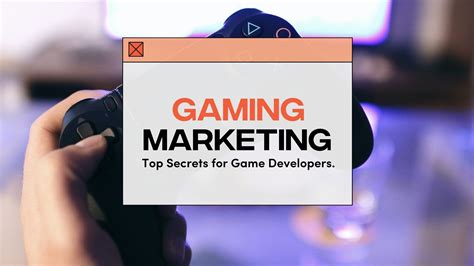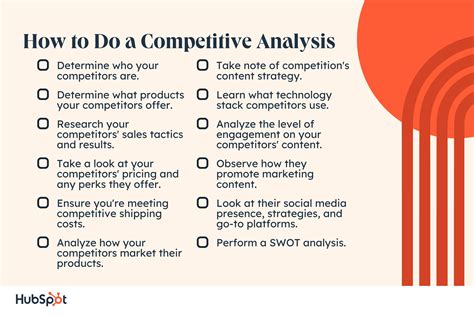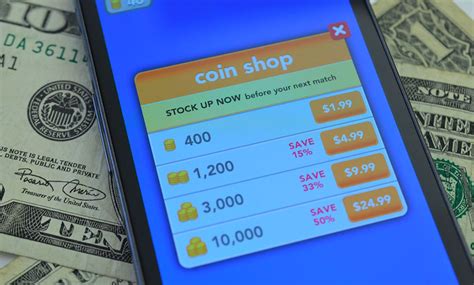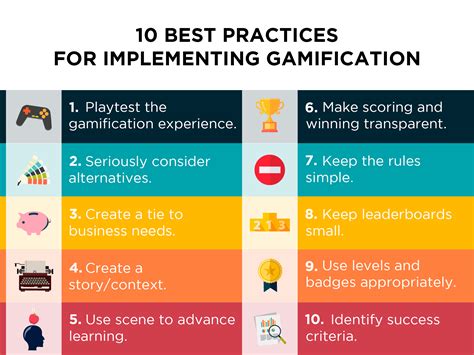Breaking News


Popular News


Learn effective marketing strategies for mobile gaming development including understanding audience, analyzing competitors, in-app purchases, social media promotion, gamification, and targeted ads.Are you a mobile gaming developer looking to boost the success of your game? Whether you’re a newcomer to the industry or an established developer, it’s crucial to stay ahead of the game when it comes to marketing strategies. In this blog post, we’ll explore various tactics to help you maximize the potential of your mobile game. From understanding your audience and analyzing competitors’ strategies to implementing in-app purchases and leveraging social media for promotion, there are numerous avenues to explore. Additionally, we’ll delve into the benefits of gamification techniques and utilizing user data for targeted advertising. By the end of this post, you’ll have a comprehensive understanding of how to effectively market your mobile game and stand out in a crowded marketplace. Join us as we uncover the essential strategies for mobile gaming developers to reach and engage their target audience.
Contents

When it comes to developing successful marketing strategies for mobile gaming, one of the key factors to consider is understanding the audience. Mobile gamers are a diverse group, ranging from casual players to hardcore enthusiasts, each with their own preferences and behaviors. By analyzing player data and demographics, developers can gain valuable insights into the types of games that appeal to different audiences, as well as the features and monetization methods that are most effective.
With this information in hand, developers can tailor their marketing efforts to specific segments of the mobile gaming audience, creating targeted advertisements and promotions that are more likely to resonate with potential players. This not only helps to increase the overall effectiveness of marketing campaigns but also contributes to a more engaging and personalized experience for players, ultimately strengthening their connection to the game and the brand.
Furthermore, understanding the mobile gaming audience is crucial for informing decisions about game design and development. By identifying the preferences and habits of different player segments, developers can make informed choices about the game’s features, mechanics, and overall design, ensuring that it effectively meets the needs and desires of its target audience.
Overall, a deep understanding of the mobile gaming audience is essential for creating successful marketing strategies, informing game design decisions, and fostering a strong connection between players and the game. By leveraging data-driven insights and targeting specific audience segments, developers can improve the effectiveness of their marketing efforts and create more engaging and successful mobile games.

When it comes to the competitive world of mobile gaming, analyzing your competitors’ strategies is crucial for staying ahead in the market. One way to do this is by conducting a thorough SWOT analysis to identify your competitors’ strengths, weaknesses, opportunities, and threats. By understanding their strengths, you can learn from their successes and apply similar strategies to your own game development and marketing efforts.
Furthermore, using analytical tools such as App Annie and Sensor Tower can provide valuable insights into your competitors’ download and revenue numbers, user retention rates, and average revenue per user. This data can help you identify trends and understand what is working well for your competitors, allowing you to make more informed decisions for your own game.
Additionally, it is important to monitor your competitors’ marketing efforts and user engagement strategies. Are they leveraging social media effectively? Are they collaborating with popular influencers or YouTubers? By identifying successful marketing tactics, you can adapt and improve your own marketing campaigns to reach a wider audience and attract more players to your game.
Finally, studying your competitors’ game updates and new features can help you stay on top of industry trends and better understand what players are looking for in a game. This will allow you to make informed decisions about the direction of your own game development and provide a competitive edge in the ever-changing mobile gaming landscape.

Marketing Strategies for Mobile Gaming Developers
When it comes to increasing revenue for mobile gaming developers, in-app purchases are an effective strategy. By offering players the opportunity to buy virtual goods or access additional features within the game, developers can tap into a lucrative revenue stream.
One way to incorporate in-app purchases is by offering players the option to purchase virtual currency, which can be used to buy in-game items or upgrades. This not only enhances the gaming experience for players, but also provides developers with a steady source of income.
Another effective method is to offer players the option to unlock additional levels or content through in-app purchases. This provides an incentive for players to spend money, while also allowing developers to extend the lifespan of their games and keep players engaged for longer periods of time.
By implementing in-app purchases, mobile gaming developers can diversify their revenue streams and create a more sustainable business model, ultimately leading to greater success in the competitive mobile gaming market.
| Pros | Cons |
|---|---|
| Steady source of income | May alienate some players |
| Extended gameplay and engagement | Requires careful balancing to avoid pay-to-win situations |

Marketing Strategies for Mobile Gaming Developers
Utilizing social media for promotion is an essential aspect of marketing for mobile gaming developers. With the widespread use of platforms such as Facebook, Twitter, and Instagram, social media provides an opportunity to reach a large audience of potential players. By creating engaging and shareable content, developers can harness the power of social media to generate buzz and increase visibility for their games.
One effective strategy for social media promotion is to collaborate with popular influencers in the gaming community. By partnering with well-known gamers or streamers, developers can tap into their large fan bases and leverage their influence to promote new releases or updates. This can result in increased exposure and excitement surrounding the game, ultimately driving more downloads and engagement.
In addition to influencer partnerships, developers can also use targeted advertising on social media platforms to reach specific demographics of players. By utilizing the advanced targeting options available, developers can tailor their ads to reach the right audience based on factors such as age, location, and interests. This can result in higher conversion rates and a more efficient use of advertising budgets.
| Benefits of Social Media Promotion | Effective Strategies | Targeted Advertising |
|---|---|---|
| – Increased visibility | – Collaborating with influencers | – Reaching specific demographics |
| – Generating buzz | – Creating engaging content | – Tailoring ads for higher conversions |
| – Driving more downloads | – Leveraging influencer influence | – Efficient use of advertising budgets |
In conclusion, the use of social media for promotion is a powerful tool for mobile gaming developers to increase visibility, generate excitement, and reach their target audience. By implementing effective strategies such as influencer collaborations and targeted advertising, developers can leverage the widespread reach and engagement potential of social media platforms to drive success for their games.

Implementing Gamification Techniques
Gamification techniques have become an essential part of mobile gaming strategies. By incorporating game-like elements such as rewards, challenges, and leaderboards, developers can enhance user engagement and retention. One effective strategy is to use gamification to create a sense of accomplishment and progression for players, encouraging them to continue playing and interacting with the game.
Additionally, implementing gamification techniques can also improve the overall user experience. By adding elements such as badges, levels, and virtual currencies, developers can make the game more immersive and enjoyable for the players. This can lead to increased user satisfaction and positive word-of-mouth, which is crucial for the success of mobile games in a highly competitive market.
In conclusion, implementing gamification techniques is a crucial aspect of mobile gaming marketing strategies. By creating a more engaging and rewarding experience for players, developers can increase user retention, satisfaction, and monetization. With the right gamification strategies, developers can effectively differentiate their games in a crowded market and achieve long-term success.

One of the most powerful marketing strategies for mobile gaming developers is the ability to leverage user data in order to target specific audiences with personalized ads. With the vast amount of data that mobile gaming apps can collect from users, including their in-game behavior, demographics, and preferences, developers have the opportunity to create highly targeted ad campaigns that are more likely to resonate with their audience.
By analyzing user data, developers can gain valuable insights into the types of games that their users are most interested in, as well as their spending habits and in-game behavior. This allows developers to create ads that are tailored to their audience’s specific interests and preferences, increasing the likelihood of engagement and conversion. Additionally, by leveraging user data, developers can also segment their audience and target specific user groups with ads that are most relevant to them.
Furthermore, leveraging user data for targeted ads also allows developers to track the effectiveness of their ad campaigns and make data-driven decisions on future marketing strategies. By analyzing the performance of their ads and understanding which user segments are most responsive, developers can continuously optimize their ad campaigns to maximize their return on investment.
| User Data | Benefits |
|---|---|
| Demographics | Target specific user groups with personalized ads |
| In-game behavior | Create ads tailored to users’ gaming preferences and habits |
| Spending habits | Optimize ad campaigns to maximize ROI |
Leveraging user data for targeted ads not only allows mobile gaming developers to reach their audience more effectively, but also provides valuable insights for improving the overall user experience and app monetization strategies.

What are some effective marketing strategies for mobile gaming developers?
Some effective marketing strategies for mobile gaming developers include influencer partnerships, social media advertising, app store optimization, and creating engaging promo content.
How can mobile gaming developers benefit from influencer partnerships?
Influencer partnerships can help mobile gaming developers reach a wider audience, build credibility, and generate buzz around their games through authentic and engaging content.
What is app store optimization and why is it important for mobile gaming developers?
App store optimization involves optimizing app store listings to improve visibility and increase downloads. It is important for mobile gaming developers to stand out in a crowded marketplace and attract more players to their games.
How can social media advertising help mobile gaming developers?
Social media advertising can help mobile gaming developers target specific audience segments, drive app installs, and increase brand awareness through engaging ad creatives and targeted campaigns.
What are some key elements of creating engaging promo content for mobile games?
Some key elements of creating engaging promo content for mobile games include showcasing gameplay highlights, creating captivating storytelling, and highlighting unique features to capture audience attention.
How important is community engagement for the success of mobile gaming developers?
Community engagement is crucial for the success of mobile gaming developers as it helps build a loyal player base, gather feedback for game improvements, and create a sense of belonging among the gaming community.
Why is it essential for mobile gaming developers to continuously analyze and adapt their marketing strategies?
It is essential for mobile gaming developers to continuously analyze and adapt their marketing strategies to keep up with industry trends, reach new audiences, and stay ahead of competitors in the dynamic mobile gaming landscape.